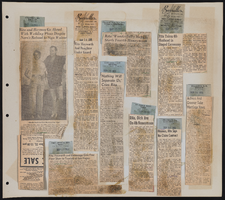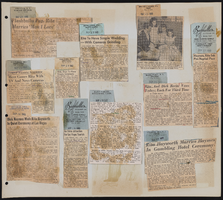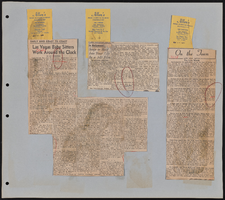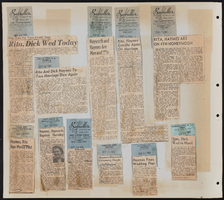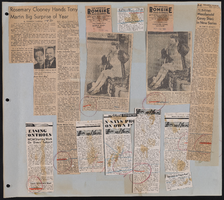Search the Special Collections and Archives Portal
Search Results

Transcript of interview with Judith Ann Allaire by Tracye Ann Collins, March 10, 1980
Date
Archival Collection
Description
Text
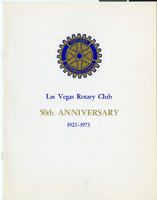
Las Vegas Rotary Club 50th Anniversary Program, 1973
Date
Archival Collection
Description
Text

Transcript of interview with Velma Haselton by Catherine Bellver, September 13, 2001
Date
Archival Collection
Description
Interviewed by Catherine Bellver. Velma Haselton was born in St. Louis, Missouri, in 1914. She worked as an assistant bookkeeper for Hart, Schaffner and Marx and rose to Assistant Credit Manager. Velma worked at various jobs after she married for the second time and her son was born. She also represented the San Francisco CPA firm Lybrand, Ross Brothers and Montgomery (now Coopers Lybrand) in various capacities, both in California and St. Louis, eventually attaining the position of controller. Velma moved to Las Vegas for the first time in the 1950s, where she and her husband Don ran a coffee shop at the Park Lane Motel on South Fifth Street. Family requirements necessitated a move back to California. In 1971, Velma and her third husband, Charles Haselton, "retired" to Las Vegas. Velma immediately went to work as a cost accountant for United Pipeline, and later as an accountant for Kafoury Armstrong, a CPA firm. She eventually ran her own accounting business. Velma also held memberships and offices in various women's service groups.
Text

Barbara Millington interview, March 2, 1980: transcript
Date
Archival Collection
Description
On March 2, 1980, collector David Mowrey interviewed Barbara Millington (born July 3rd, 1937 in Oak Creek, Colorado) at her home in Las Vegas, Nevada. In this interview, Mrs. Millington discusses moving to Las Vegas, Nevada with her family and working various jobs including at Vegas Village and becoming a bookkeeper at a construction firm. She also speaks about the changes she has seen in Las Vegas, such as how casinos were when she first came here compared to how they are now. She ends the interview talking about the need for Las Vegas to find industry outside of gaming. She discusses the need for young people to come back after going away to college to improve the city.
Text
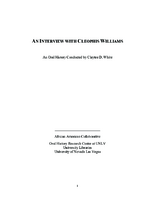
Transcript of interview with Cleophis Williams by Claytee White, April 27, 2010
Date
Archival Collection
Description
In 1943, Cleophis Hill Williams was a teenager visiting her mother who had moved to Las Vegas. For most of her young life she had lived with her parents in Muskogee, Oklahoma and Paul Spur/Douglas, Arizona. The same year that she visited Las Vegas, she met her future husband Tom Williams, with whom she had nine children, all born and raised on the Westside. Tom worked construction and built their first home on G Street. For Cleophis, she focused her life on raising her children and, whenever possible, finding some precious time to read.
Text

